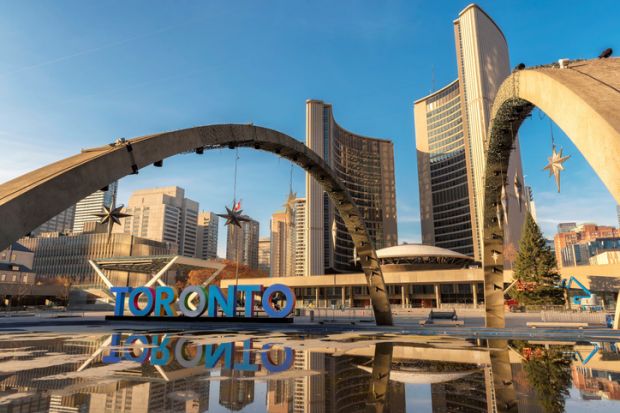The “power of place” and a city’s quality can be crucial for universities in recruiting academics, and that factor is unlikely to be diminished by the coronavirus pandemic, according to leading urban theorist Meric Gertler.
Professor Gertler, who took over as president of the University of Toronto in 2013 with a key priority to “leverage” the institution’s urban locations “more fully, for the mutual benefit of university and city”, was speaking at the Times Higher Education World Academic Summit.
Professor Gertler said his time as dean of the Faculty of Arts and Science at Toronto had showed him that when competing to recruit academics “with other great institutions around the world”, “more often than not it was the quality of the city that helped tip the balance in our favour”.
So when he became president, Professor Gertler said there was “one asset right on our doorstep that we need to take advantage of in a more systematic and intentional way – and that’s the city around us”.
He argued that in research there were “really compelling challenges and opportunities that cities face, and we should make it easier for our faculty to engage in that research”, providing a “double pay-off” by helping to advance academics’ careers and also in “making Toronto a better place”, which in turn benefits the university.
Professor Gertler was asked about the results of the THE Power of Place survey, completed by just under 600 respondents from 58 different countries and illustrating how a host of non-institutional factors can play a significant role in attracting and retaining staff.
The importance of place in recruitment “applies at every rank” of academic life, including for junior scholars, who are more likely to have children at an age where “quality of schools [and] day care” are important considerations, he argued.
Professor Gertler’s academic research has examined why, despite the rise of knowledge-based economic activity that would seem to allow individuals involved greater freedom about where they choose to locate, geography matters more in the new economic age.
This was because “if you can live anywhere, you’re more likely to pick places that are desirable”, and because of the “importance of physically being close to other economic actors with whom you interact in order to facilitate mutual understanding” in knowledge-based industries, he argued.
Asked if the Covid era could make urban environments less attractive, Professor Gertler noted reports of some city dwellers moving out, but said it was “too soon to tell” and suggested that people actually wanted to “re-embrace the possibilities of being together socially”.
“I’m a bit of a sceptic – I’m not forecasting that we are going to see a massive reduction in the power of place because of the pandemic,” he added.
POSTSCRIPT:
Print headline: The Power of place: urban attractions will remain recruitment draw despite coronavirus, says Gertler
Register to continue
Why register?
- Registration is free and only takes a moment
- Once registered, you can read 3 articles a month
- Sign up for our newsletter
Subscribe
Or subscribe for unlimited access to:
- Unlimited access to news, views, insights & reviews
- Digital editions
- Digital access to THE’s university and college rankings analysis
Already registered or a current subscriber? Login







